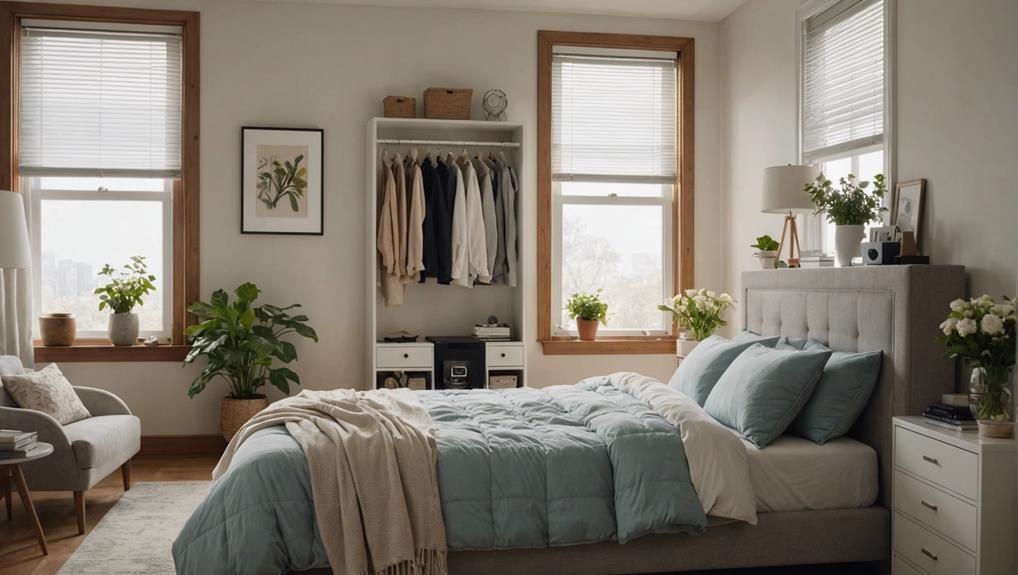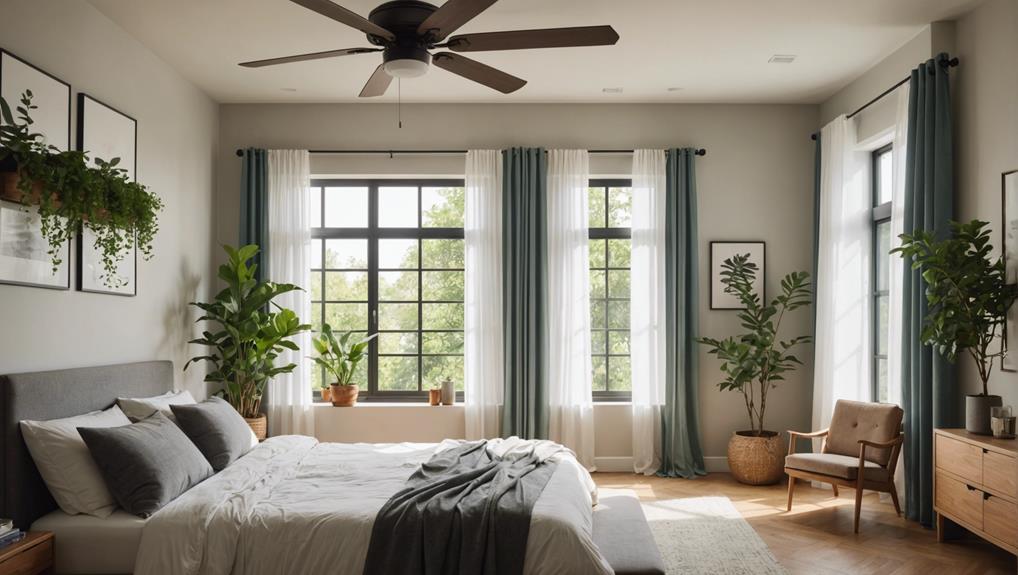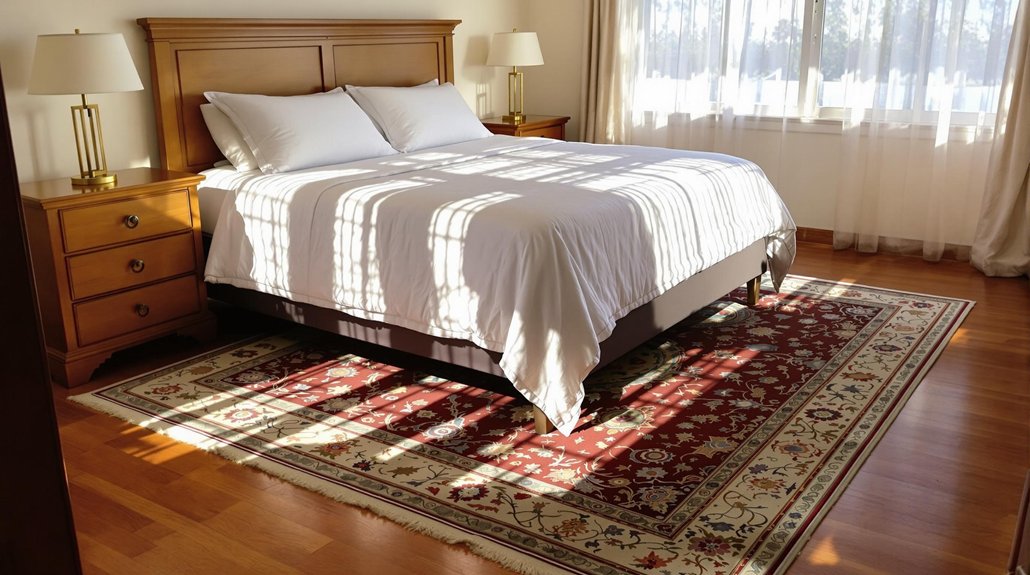
Identifying and Eliminating Musty Smells in Your Bedroom
To eliminate musty smells in your bedroom, start by identifying moisture sources. Check for damp areas, leaks in windows or ceilings, and inspect bedding. Review carpets for discoloration or mold, especially near windows and radiators. Examine plumbing for leaks and fix any immediately. Inspect walls for mold and address with dehumidifiers and improved ventilation. Don't forget to check the roof for damaged shingles and leaks. Guarantee proper ventilation with open windows and exhaust fans. Consider using air purifiers and dehumidifiers to maintain low humidity. For more steps and detailed approaches, continue with…
Key Takeaways
- Inspect areas prone to dampness and mold, such as walls, carpets, and bedding.
- Ensure proper ventilation by maintaining open windows and using exhaust fans.
- Use dehumidifiers to control humidity levels and reduce moisture.
- Check for and promptly repair any plumbing or roof leaks.
- Consider using air purifiers with HEPA filters to remove musty odors.
Identify Musty Smells
To identify musty smells in your bedroom, start by examining areas prone to dampness or visible signs of mould, such as walls, ceilings, and furniture. Musty odours often originate from these locations due to their susceptibility to moisture accumulation. Check for discoloration, peeling paint, or a fuzzy texture that indicates mould growth.
Next, inspect your bedding for dampness. Damp bedding can become a breeding ground for mould and mildew, which emit musty odours. Make sure your bedding is dry and clean, as unclean or damp bedding can trap moisture and foster mould growth. If you find dampness, consider laundering your bedding more frequently or using a dehumidifier to reduce humidity levels.
Bedrooms with poor ventilation and high humidity are particularly prone to developing musty smells. Maintain adequate airflow by opening windows regularly and using fans to circulate air. Additionally, investigate any potential leaks in your room, such as from windows or ceilings, as leaks contribute to a moist environment conducive to mould growth.
Inspect Carpets for Mould
Begin inspecting carpets for mould by lifting the edges and checking the underside for discoloration or a musty smell. Pay special attention to areas near windows or radiators where moisture can accumulate. Natural wool carpets are particularly susceptible to mould infestations due to their composition, so give these areas extra scrutiny.
Regular carpet maintenance is essential for mould prevention. Vacuum your carpets frequently and use a dehumidifier to control humidity levels in the room. If you find any mould, contemplate replacing the carpet to prevent future issues.
Here's a quick guide to help you through the process:
| Step | Action |
|---|---|
| 1. Lift carpet edges | Check for discoloration, spots |
| 2. Smell underside | Detect musty odor |
| 3. Inspect near windows | Look for moisture buildup |
| 4. Maintain carpets | Vacuum and dehumidify regularly |
If you discover mould, don't delay in taking action. Remove and clean the affected area thoroughly, and make sure proper ventilation in the room to keep moisture levels low. For persistent problems, you might want to contemplate replacing carpets with other flooring types less prone to mould growth. This proactive approach to carpet maintenance will greatly aid in mould prevention and keep your bedroom fresh and healthy.
Check for Plumbing Leaks
After inspecting your carpets, shift your focus to checking for plumbing leaks that might be the hidden culprit behind musty smells in your bedroom. Start with a thorough pipe inspection. Look for signs of water damage such as discolored areas, warping, or soft spots on your bedroom walls and floors. These indicators often point to leaks within the plumbing system.
Leaks from pipes in or near bedrooms, especially in homes with en suites or adjacent bathrooms, can lead to musty odors and mold growth. Even minor leaks can create significant issues over time.
Pay close attention to any unusual dampness or water stains as these are strong evidence of underlying plumbing problems.
Don't overlook older houses, which often have unique plumbing systems that might hide leaks more effectively. Professional plumbers can diagnose and fix leaks within walls or floors if you're unable to locate the source yourself.
Regular maintenance and timely pipe inspection can prevent water damage and eliminate musty smells.
Examine Walls for Mould
Carefully inspect your bedroom walls for any visible signs of mould, such as dark patches or discoloration. Use a flashlight to check corners, behind furniture, and around windows where mould tends to hide. Mould on walls is more than an eyesore; it's a health hazard that can cause respiratory problems and contribute to musty smells.
To guarantee effective mould detection and removal, follow these steps:
- Thorough Inspection: Use a flashlight to meticulously check every wall surface, especially in areas prone to dampness.
- Immediate Action: If you find mould, avoid simply painting over it. This won't solve the problem and can lead to further spread. Instead, clean the affected area with a mould remover.
- Consult a Professional: For extensive mould issues, it's best to bring in a professional to ensure thorough removal and to prevent recurrence.
- Moisture Control: Address the underlying moisture issue causing mould growth. This could involve improving ventilation, using dehumidifiers, or fixing leaks.
Address Roof Leaks
Identifying and repairing roof leaks promptly is essential to prevent mould growth and musty odors in your bedroom. Inadequate roof maintenance can lead to water damage, which manifests as discolored or irregular surfaces on your ceiling. These signs shouldn't be ignored, as they indicate that water is infiltrating your home, creating a conducive environment for mould proliferation.
First, inspect your roof for any damaged or missing shingles that could allow water ingress. Pay particular attention to any areas where ceilings appear damp or stained. These patches are telltale signs of a leaking roof and require immediate attention. Failure to address these issues can result in more severe water damage, potentially causing ceilings to collapse.
Utilize a flashlight to examine your attic or loft thoroughly. Look for damp insulation or wet wooden beams, which suggest active leaks. Once identified, repair the roof promptly. This may involve replacing damaged shingles, sealing cracks, or even consulting a professional for extensive roof maintenance.
Maintain Heating Systems
Regularly servicing the heating systems in your bedroom is vital to ensuring they operate efficiently and prevent moisture build-up. A well-maintained heating system can greatly reduce the chances of musty smells by controlling humidity levels and preventing mold growth.
You need to monitor radiator efficiency to make sure they provide adequate heating without consuming excessive energy. Radiators should be bled at least once a year to remove trapped air, which can affect their performance.
Ensuring proper insulation in your bedroom is also essential. Insulated walls help maintain a consistent temperature and reduce the risk of moisture absorption, which can lead to mold and mildew. Before wallpapering or painting, check the insulation to prevent long-term issues.
Here are some steps you can take to maintain your heating systems effectively:
- Monitor radiator efficiency: Check for cold spots and bleed radiators yearly to keep them working efficiently.
- Ensure proper insulation: Insulate walls properly before any decorative work.
- Service heating units: Schedule annual maintenance for heaters to ensure they're functioning correctly.
- Maintain consistent temperature: Keep your bedroom at a comfortable, consistent temperature to control humidity.
Improve Ventilation

To improve ventilation and reduce musty smells, start by opening windows and doors daily to promote fresh air circulation.
Use exhaust fans in moisture-prone areas like bathrooms to minimize condensation and mold growth.
Additionally, installing air purifiers can help maintain a clean and fresh environment by filtering out airborne particles and odors.
Open Windows Regularly
By regularly opening your bedroom windows, you allow fresh air to circulate, helping to eliminate musty odors and improve overall air quality. Natural ventilation is a highly effective method to maintain a fresh atmosphere in your bedroom. Fresh air circulation reduces moisture levels, preventing conditions that favor mold growth. This not only eliminates musty smells but also promotes a healthier living environment.
To maximize the benefits of natural ventilation, consider the following steps:
- Daily Window Maintenance: Make sure that your windows are in good working condition. This includes checking for any blockages or damages that might obstruct airflow.
- Optimal Timing: Open your windows during times when outdoor air quality is at its best, typically in the morning or late evening.
- Cross-Ventilation: Create a cross-breeze by opening windows on opposite sides of the room. This enhances airflow and speeds up the removal of stale air.
- Seasonal Adjustments: Adapt your ventilation strategy based on the season. In colder months, brief, regular airing sessions can balance heat retention with air quality.
Use Exhaust Fans
Exhaust fans play an important role in improving bedroom ventilation by efficiently expelling stale, moist air and drawing in fresh air. Proper exhaust fan placement is essential for maximizing their effectiveness. Ideally, you should install exhaust fans near sources of moisture, such as adjacent bathrooms or kitchens, to prevent humidity from migrating to your bedroom. This strategic placement helps in maintaining low humidity levels, thereby deterring mold growth and eliminating musty odors.
Consistent use of exhaust fans is essential for preventing condensation build-up, a common cause of musty smells. Turning on the exhaust fan during and after activities that generate moisture, like showering or cooking, will greatly improve air quality throughout your home, including your bedroom.
Fan maintenance is equally important. Regularly clean the fan blades and surrounding areas to ensure peak performance. Dust and grime can accumulate over time, reducing the fan's efficiency and potentially circulating contaminants back into the room. By sticking to a maintenance schedule, you can guarantee that your exhaust fans operate at peak efficiency, continually providing fresh air and effectively combating musty odors in your bedroom.
Install Air Purifiers
Air purifiers greatly improve bedroom ventilation by removing allergens, dust, and musty odors from the air. These devices are particularly effective at enhancing air quality through HEPA filters, which capture tiny particles like mold spores, pet dander, and dust mites, thereby reducing indoor air pollution.
By continuously circulating clean air, air purifiers can prevent mold growth and musty smells, creating a healthier and fresher environment.
To guarantee you maximize air purifier benefits and effectiveness, follow these steps:
- Choose the Right Purifier Model: Look for models with HEPA and carbon filters. HEPA filters capture particles as small as 0.3 microns, while carbon filters neutralize odors.
- Proper Placement: Position the air purifier in an area with good airflow, away from walls and furniture, to ensure ideal air circulation.
- Regular Maintenance: Replace filters according to the manufacturer's recommendations to maintain efficiency. A clogged filter won't effectively clean the air.
- Consider Room Size: Select a purifier appropriate for your bedroom size. A model too small won't effectively purify the air, while an oversized one may be unnecessarily costly.
Use a Dehumidifier
A dehumidifier effectively reduces moisture levels in your bedroom, preventing the growth of mould and the onset of musty odors. Precise humidity control is vital; maintaining levels between 30-50% guarantees a dry environment, thwarting mould and mildew development. Dehumidifiers excel in moisture removal, extracting excess water vapor from the air, which is particularly beneficial in damp or poorly ventilated spaces.
By integrating a dehumidifier into your bedroom, you create an inhospitable environment for mould spores and bacteria that thrive on high humidity. This not only eliminates musty smells but also improves overall air quality significantly. It's essential to position your dehumidifier in a central location for peak performance, ensuring even moisture removal throughout the room.
Investing in a dehumidifier is a proactive measure. Modern models offer features like hygrometers to monitor and adjust humidity levels automatically, making humidity control effortless. Regular maintenance, such as cleaning the filter and emptying the water reservoir, ensures it operates efficiently.
To conclude, using a dehumidifier is a precise, evidence-based approach to keeping your bedroom fresh, odor-free, and conducive to a healthy living environment.
Frequently Asked Questions
How Do I Find the Source of a Musty Smell in My Bedroom?
To find the source of a musty smell, start by conducting ventilation checks and inspecting air quality. Look under furniture, in closets, and around air vents for moisture damage or mold. Consider hiring a professional for thorough inspection.
How to Stop a Bedroom From Smelling Musty?
To prevent a bedroom from smelling musty, make sure to have proper ventilation by opening windows or using extractor fans. Regular cleaning of bedding, curtains, and surfaces helps to avoid odors. Address any structural issues like damp walls or leaks promptly.
Why Does My Bedroom Smell Musty but No Mold?
Your bedroom smells musty without visible mold due to dirty laundry, humid air, and lack of ventilation. Regularly clean your bedding, air out the room, and use a dehumidifier to reduce moisture and eliminate odors.
How Do You Identify a Musty Smell?
To identify a musty smell, rely on your odor detection skills. A damp, earthy odor typically signals poor air quality. Check for moisture, visible mold, or mildew to pinpoint the source and improve air quality.
Conclusion
By identifying musty smells and inspecting areas like carpets, plumbing, and walls for mold, you can address hidden issues effectively.
Don't forget to check for roof leaks and maintain your heating systems to prevent moisture build-up.
Improving ventilation and using a dehumidifier will greatly reduce humidity levels.
Implement these evidence-based strategies to eliminate musty odors and create a healthier living environment in your bedroom.
You'll notice a fresher, more comfortable space in no time.



Leave a Reply